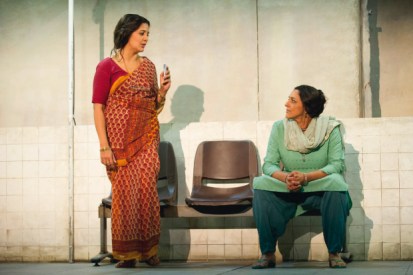In October 2011 anti-capitalist vagrants built an open-air squat outside St Paul’s within shrieking distance of London’s financial heart. The City thrummed all night with the dob-dob-dob of bongo recitals while the rebels held angry debates beneath their plastic canopies and declared the Square Mile knee-deep in ordure. To press the point they used nearby alleys for their ablutions. This half-forgotten protest has become a play in which the central figure, the dean, has to choose between evicting and accommodating his crusty tenants. Conscience informs him that the noisy campers are Christ’s spiritual heirs. But temporal responsibility obliges him to heed his Square Mile parishioners and sweep the ragamuffins from the City’s doorstep.
The play is abstract, subtle, wordy, highly cerebral. Simon Russell Beale applies all his zestful intelligence to the role of the tortured dean but he seems to know that the emotional ingredients will never heat up beyond Gas Mark three. This doesn’t matter. Sophisticated understatement is the artistic goal here. The real star of the show is the culture of the Anglican elite, its rhetoric, its gossipy erudition, its furtive vanity, its sly habits of mockery and humiliation. We’re led into this half-hidden world and shown all its clutter and wrinkles by an expert writer, Steve Waters, who sets about his task of ironic dissection with palpable delight. The only false note is the ‘comedy secretary’, a geeky bombshell with a Twitter account who can’t adapt to the donnish mood of the dean’s office. She feels like a refugee from a sitcom.
Two real-life eminences are portrayed. The Canon Chancellor is based on Giles Fraser, a harmless but relentless natterjack, who quit the cathedral in a storm of publicity when he learned that the bivouacking limpets were about to be dislodged by force. Fraser’s resignation arose from ‘principle’ and he’s been adding to his ‘principle’ ever since thanks to the Guardian, which employs him as a scribbling mystic who communes with Christ and Marx interchangeably. He’ll be thrilled to see himself represented by Paul Higgins, a slim athletic actor with a luxuriance of foppish curls. It’s like watching the chap from Poldark playing Eric Pickles. The Bishop of London, Richard Chartres, appears as a shrewd scholarly busybody who cruises in and out of the dean’s office to ‘advise’ (i.e., gloat) over each new twist in the saga. This portrayal is not quite hostile but it’s hardly a snapshot the bishop would volunteer to preserve. If he has enemies (and I mention that as a remote but tangible possibility), they will fill the theatre for the entirety of the run. Join them. This play is a treasure.
Antique comedy at the Olivier. The Beaux’ Stratagem, like many an 18th-century classic, is apt to be stuffy, ostentatious and even doctrinaire with the actors enjoying the onstage larks all too much, and the audience all too little. These pitfalls are avoided in Simon Godwin’s outstanding production. Style, intelligence and high humour rise to a glorious pitch in a show that honours the historic setting but finds room for a surreptitious nod towards modernity.
The plot is a lively brew of infidelity, avarice and theft, and the script contains rough sketches of familiar archetypes. The undercover butler, Archer, feels like an early stab at Jeeves. A brutish highwayman named Gibbet is surely the prototype of Bill Sikes. In the opening scene a fake aristocrat uses a box of valuables to persuade an innkeeper of his noble lineage. Lord Melbury does the same thing in Fawlty Towers. And Oscar Wilde borrowed liberally from the final act where astronomical fortunes change hands within a few lines of dialogue and a lovelorn pauper is revealed to be a landed gent.
The performances here are full of lightness and charm. Susannah Fielding plays an acerbic sex bomb unhappily married to a vomiting oaf, and she delivers her witty attacks on matrimony with half an eye on contemporary feminism. Geoffrey Streatfeild is wonderfully debonair as Archer. And he teams up with Pearce Quigley (as Scrub) to pull off the near-impossible by performing a comic song and making it appear improvised on the spot. Quigley is worth a rave in his own right. Casting directors praise him to the skies but he hasn’t quite cut through yet. He’s eccentric, languid and rather dour to look at, but his manner is full of quizzical merriness. His touch in this play is magnetic. He can at any moment compel the show, and the entire house, to adopt his chosen rhythm. Yet he works without artifice or calculation. Try to discover what he’s doing and you find a void. The cause is invisible. All you feel is the effect. He’s one of the funniest stage comedians alive.







Comments